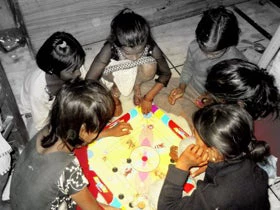
The issue of more and better jobs will stand ill addressed if this illiterate, non skilled, yet potential workforce is not tapped. I call this group the 'potential workforce' because I have seen the resilience of even the mediocre ones among them come out victorious in their struggle for survival. It is this group that needs to be effectively trained. For two years at Protsahan, we have trained some of these women how to make candles, sanitary napkins and hand bags. Just one skill was enough to increase their personal incomes by more than 400%. Although still at a very nascent stage, the economics of the entire community have shifted favorably. Better incomes resulted in better healthcare for their children and, more importantly, it created a sense of dignity that was essential to complete their womanhood. This sense of dignity might be an immeasurable metric, but it sure could be a direct index of the economy's well being, although on a micro-level.
India’s economic future to a large extent lies in the entrepreneurial skill based training of this section of its citizens. India’s slums do not need blind charity from foreign organizations but high- impact investment in skill training, especially of its women and girls. Entrepreneurship is not just the forte of the holders of management degrees. There is untapped brilliance in these future ‘slumdog entrepreneurs’ who, if trained well, will rise up to be the next Asian tigers. This approach will harness the locally available resources for generating more employment and incomes, lead to more capital formation, as well as balanced regional development, and end up creating a talent pool of entrepreneurial women in the slums. Also, it is a known fact that the poor, especially the women, have a better record of loan repayments than their richer counterparts. They are not scared of taking risks; living in the slums, they anyway deal with harsher risks every day.
At the global level, it is highly unlikely that the millennium development goals will be achieved with the clichéd and mundane approaches and resting on only what the public sector has to offer. The governments, more often than not, have failed to deliver highly innovative solutions. They however can scale up approaches that work. These approaches have to be thought of by young people now for it is they who will create history tomorrow. If we are to end poverty, it is essential that we mould our education to promote entrepreneurship, even in extremely poor communities. This way, the entrepreneurs that arise out of the slums will not only end up addressing the pain points of their own low household earnings, but also end up creating a higher happiness index for their entire community, starting with their own selves.
When hope is hungry, everything feeds it" ~Mignon McLaughlin, The Neurotic's Notebook, 1960


Join the Conversation